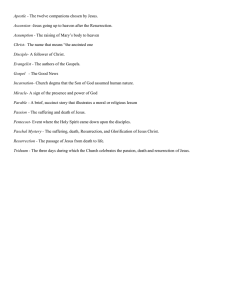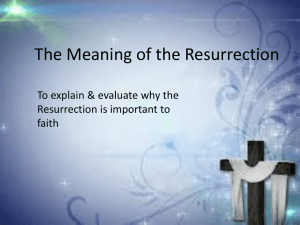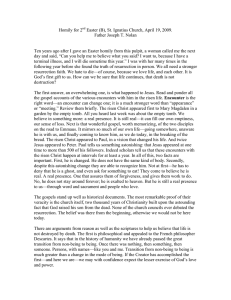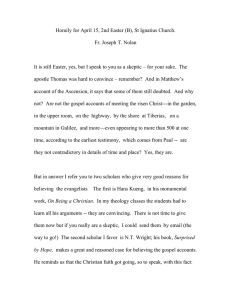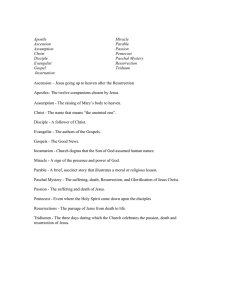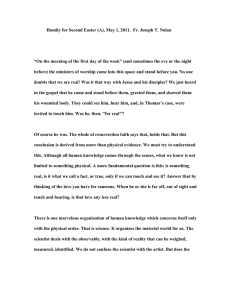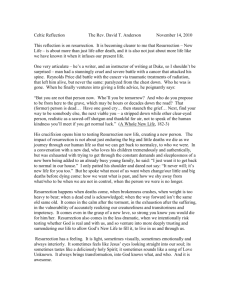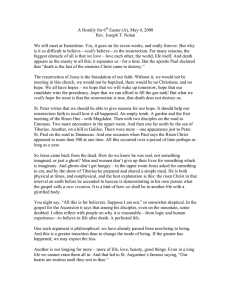The Logic of Resurrection | The Rev. Dr. Randall K. Bush | East
advertisement
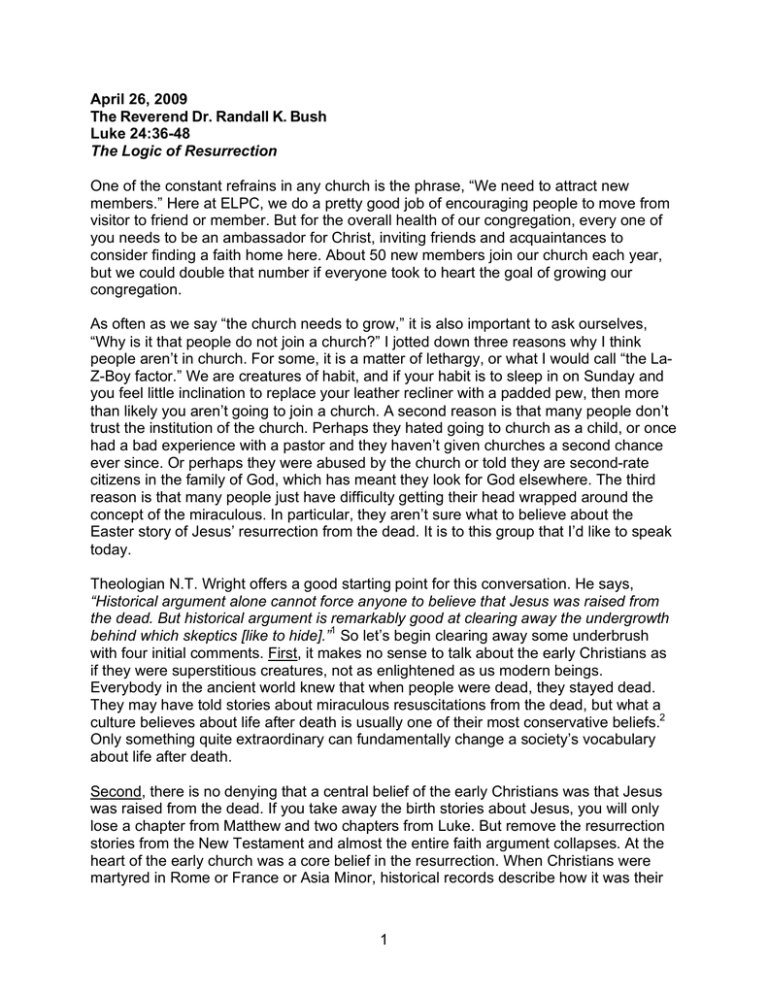
April 26, 2009 The Reverend Dr. Randall K. Bush Luke 24:36-48 The Logic of Resurrection One of the constant refrains in any church is the phrase, “We need to attract new members.” Here at ELPC, we do a pretty good job of encouraging people to move from visitor to friend or member. But for the overall health of our congregation, every one of you needs to be an ambassador for Christ, inviting friends and acquaintances to consider finding a faith home here. About 50 new members join our church each year, but we could double that number if everyone took to heart the goal of growing our congregation. As often as we say “the church needs to grow,” it is also important to ask ourselves, “Why is it that people do not join a church?” I jotted down three reasons why I think people aren’t in church. For some, it is a matter of lethargy, or what I would call “the LaZ-Boy factor.” We are creatures of habit, and if your habit is to sleep in on Sunday and you feel little inclination to replace your leather recliner with a padded pew, then more than likely you aren’t going to join a church. A second reason is that many people don’t trust the institution of the church. Perhaps they hated going to church as a child, or once had a bad experience with a pastor and they haven’t given churches a second chance ever since. Or perhaps they were abused by the church or told they are second-rate citizens in the family of God, which has meant they look for God elsewhere. The third reason is that many people just have difficulty getting their head wrapped around the concept of the miraculous. In particular, they aren’t sure what to believe about the Easter story of Jesus’ resurrection from the dead. It is to this group that I’d like to speak today. Theologian N.T. Wright offers a good starting point for this conversation. He says, “Historical argument alone cannot force anyone to believe that Jesus was raised from the dead. But historical argument is remarkably good at clearing away the undergrowth behind which skeptics [like to hide].”1 So let’s begin clearing away some underbrush with four initial comments. First, it makes no sense to talk about the early Christians as if they were superstitious creatures, not as enlightened as us modern beings. Everybody in the ancient world knew that when people were dead, they stayed dead. They may have told stories about miraculous resuscitations from the dead, but what a culture believes about life after death is usually one of their most conservative beliefs.2 Only something quite extraordinary can fundamentally change a society’s vocabulary about life after death. Second, there is no denying that a central belief of the early Christians was that Jesus was raised from the dead. If you take away the birth stories about Jesus, you will only lose a chapter from Matthew and two chapters from Luke. But remove the resurrection stories from the New Testament and almost the entire faith argument collapses. At the heart of the early church was a core belief in the resurrection. When Christians were martyred in Rome or France or Asia Minor, historical records describe how it was their 1 belief about the resurrection that most troubled their persecutors. Resurrection was not a tangential part of the Christian faith. It was at the heart of the faith message from its earliest expression. Third, the first disciples telling the story of Easter and of Jesus’ resurrection were all Jewish. But the concept of resurrection as they described it was something far different from anything they had learned in their own faith tradition. Most of the language about resurrection found in the Hebrew scripture is metaphorical in nature, pointing to a future time when Israel as a nation would be restored to life and strength. Think of the famous passage in Ezekiel, in which the prophet sees a valley covered with dry bones over which God’s spirit blew and restored them to life.3 To a nation struggling in exile far from their homeland, Ezekiel’s resurrection vision was intended to be a metaphor of hope about God’s promised restoration of the Israelite kingdom. There’s another passage, this time in the book of Daniel, that talks about a day of judgment when those who “sleep in the dust of the earth shall awake, some to everlasting life and some to shame and everlasting contempt.” (Dan 12:1-3) Daniel is an apocalyptic book, a book about the last days similar to book of Revelation. It describes resurrection as something happening at the end of time, when the righteous shall shine like stars in the sky. But for the early Christians, Jesus was raised from the dead right then in their lifetime. According to the Jewish tradition, resurrection happened at the end of the age. But the Easter message was that it had happened already, to one particular person. And based on that event, those believers redefined the whole Jewish way of talking about God and the world to emphasize that God’s new creation had already begun. The old was gone; the new life had come.4 Fourth, in ancient Israel, if you were going to talk about a Messiah in any convincing manner, you would never talk about one who was raised from the dead for the simple reason that nobody expected the Messiah to be killed in the first place. The Messiah was expected to defeat the Roman enemies, rebuild the temple, and reestablish God’s kingdom on earth. By being executed on the cross, Jesus of Nazareth was automatically excluded from the category of Messiahship. And by being killed, his followers had a couple choices. They could look for another messiah – perhaps one of Jesus’ brothers or another leader of his movement. But the Christians didn’t do that. Or some scholars have suggested that they could deal with their grief by speaking metaphorically about Jesus’ resurrection, telling others how the spirit of Christ was still with them. But that option has no precedent in ancient society and has never been accepted as a compelling explanation of the immediate and explosive growth of the early Christian church. As N.T. Wright put it, after Jesus was executed, nobody three days, three weeks, or three years after that event would have said he was the Messiah unless something extraordinary happened to convince them that God had vindicated this crucified prophet – something stronger than talking about his spirit being with his followers, or even grander than saying he ascended to heaven in some glorious exalted state. They might have tried to comfort one another by saying that Jesus would be raised from the dead in 2 the future. But they would never have created an explanation suggesting that this resurrection had already happened. That would have been a culturally, religiously, psychologically illogical explanation - except that this was precisely the message of the early church.5 Remember what our task here today is: It is to clear away the underbrush from the dense arguments that have grown up over the centuries to keep people from seriously grappling with what it means to follow the risen Christ. My comments may not move anyone’s posterior out of their La-Z-Boy recliner or heal anyone’s anger toward the institutional church. But maybe these remarks can provoke some thoughtful reflection on the historicity of Easter – the gospel’s steadfast description of an empty tomb and of a risen Christ seen by disciples in such a way that they were sure he was not a ghost or figment of their imagination. Our message is this: Jesus Christ is the Messiah who died and then rose again. That was the message of the early church; it is still our message today – one we are to carry out to others even as we invite them inside our doors. Ultimately, what are we offering as a church? Why does this resurrection story matter so much? It is for this simple reason. To talk about resurrection is not to talk in a nice, therapeutic way about death itself. We are not about the business of easing people’s fears about death by re-framing it as a process of resurrection. No, as Christians we are about the business of saying that death is overthrown. And by that overthrow, the power of those who depend on the threat of death has been destroyed.6 Resurrection was never a device to help us be comfortable and respectable in this world. That’s why the Christians found themselves persecuted and martyred again and again. Resurrection means making claims about Jesus that challenge all earthly powers, all political constructs, all racism, oppression, violence and addictions, injustice and general human nonsense, with a message that, by grace, has the power to set us free to a new way of life altogether. To a real resurrection now. To a resurrection hope for all time. We are all children of the Enlightenment. We love our powers of reason and trust them, perhaps a bit too much. Maybe for many of you in the pews, the news of the Easter resurrection matches the description of the disciples who saw the risen Christ in their midst, and yet of whom it is said, “While in their joy they were disbelieving” (Lk 24:41) In their joy, they were disbelieving. Yes, that often is us. Easter resurrection is something too big for mere reason; and reason alone cannot compel faith. Faith must partner with reason, trust the insights of research and reason, and clear away the tangled underbrush of skepticism with the tools and vocabulary of reason. But ultimately something deeper than reason is at work in our midst. We choose to give it a name. Resurrection. Life defeating all forms of death. A risen Savior – that is what we proclaim here and out there. Alleluia! Amen. 1 Much of the sermon relies of points made in the following book: Craig A. Evans & N.T. Wright, Jesus, the Final Days: What Really Happened, (Westminster John Knox Press, 2009). Quote above, p. 105. 2 Wright, pp. 82-83. 3 Ezekiel 37:1-14, cf. also Isaiah 26:19. 4 Wright, p. 90. 5 Wright, pp. 93-4. 6 Cf. Wright, pp. 94-5. 3
